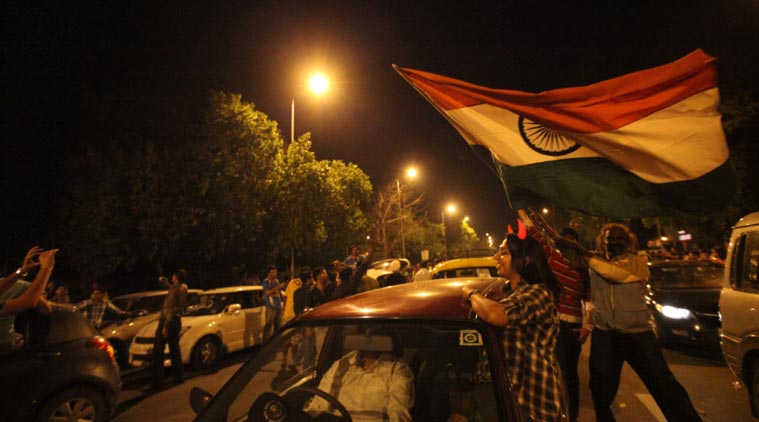May the best man win
 Passion play: Indian fans celebrate the team’s victory over Pakistan in the World Cup cricket semifinal in 2011. (Source: Express Photo by Amit Mehra)
Passion play: Indian fans celebrate the team’s victory over Pakistan in the World Cup cricket semifinal in 2011. (Source: Express Photo by Amit Mehra)
As a cub reporter in the cricket jungle, you often get lectured about the decorum of the den, the press box. Like most unwritten rules, these don’t quite register. But one trivial “do” and a rather deep “don’t”, have stayed with me for years.
Always, a wise man had once said, start moving towards the meal table a couple of overs before the lunch interval. To date, this remains a proven ploy to beat the break-time scramble for plates and scoop the spread while it is fresh and warm.
The other piece of advice, extended by an old hand during a sleepy mid-session of a boring Test match, was about practising neutrality. Given the responsibility of dispatching the day’s story with brutal objectivity, the saintly voice had whispered, “You shouldn’t have personal favourites — individuals or teams.” Trust me, unlike that lunchtime “do”, this end-of-play “don’t” has been difficult to pull off.
Imagine this: your workplace is a stadium full of flag-waving countrymen. All day, while you watch, ponder, and eventually write, there are salutations to the motherland ringing in your ears. Neutrality and dispassionate reporting aren’t easy pursuits. Like that lump in the throat that visits one in weak moments, nationalism does rise within you. But, as instructed, you keep the monster inside. You take a deep breath, or a swig of water, to push it down.
Sometimes you fail. The most stirring press-box image I have seen involved one such spectacular failure. This was last year, during Bangladesh’s World Cup game in Australia. The quarter-final against India at the majestic MCG was the lofty height Bangladesh never thought its cricketers would scale. The game started with “Amar Sonar Bangla” — cricket of late had copied football’s use of the national anthem to introduce teams. At stadiums, as close-ups of mostly scowling players flash on the giant screens, the songs become lyrical head count of fans, or a musical show of force. It’s also when the day’s first rush of nationalism surges to the head.
An elderly Bangla reporter, a regular on the circuit, had tears running down all the way to the chin as he lip-synced Tagore’s words standing next to me. We exchanged glances; he wasn’t embarrassed. He didn’t reach for a tissue.
It was a big day for his country, or so we were told. It was Bangladesh’s chance to assert its national identity, showcase the aspirations of a young nation and through this sporting success bring to the fore the country’s economic growth. Were the stakes really so high? Was it really the moment of truth for Bangladesh as a nation? Or was this the work of a spin-doctor? Wasn’t cricket merely about who scored more runs? Wasn’t it, especially this diet version, a game of glorious uncertainty? When sport isn’t even a reliable indicator of skills and athleticism of the few on field, how can the scoreboard be treated as a nation’s report card?
That’s because sport is a brilliant illusionist. It can easily con you into overestimating it. Sport can dazzle you with its grandeur and push grown-ups to childish acts. While on tour, around stadiums and team hotels, I have seen captains of industries, inspirational leaders of men and top-rankers on power lists chase cricketers with chits in hand, waving at buses, like giggly school girls. It was a show of gratitude to those who gave them the reassurance of a collective identity. Many argue that when cheering for your team, fans from different ethnicity, religion or political leanings feel one. What they forget to mention is how, after a day of bonhomie at the game, it might take just one politically wrong utterance to break these temporary sporty alliances.
It’s a proven fact that expats, regardless of the country they were born in, are among the most nationalist (read jingoistic) of fans. Before India-Pakistan games at neutral venues, it’s a funny sight to see the locals, well-settled in foreign lands, kissing flags of the country they left behind and spewing venom at rivals. Carrying the flag to Lord’s can give one a gratifying feeling of nation devotion. Perhaps, it’s a much safer and simpler option than eking out everyday livelihoods in dusty Indian lanes or guarding the LoC. But sport is best enjoyed without such distractions or pretence.
Dragging nationalism to the sporting arena is the biggest disservice one can do both to the sport and the nation. Similarly, patriotism should be unfurled only on Independence Day or, maybe, enjoyed with popcorn while watching Sunny Deol’s juvenile and comic anti-Pak rant. When at a game, the two best pals, nationalism and patriotism, are pathetic spoilsports. They make you blind to the skills of the teams that are called (misguidedly) your arch rivals; they snatch away the fun of enjoying an athletic achievement. Being neutral makes you appreciate the finer aspects of the sport. Watching a sport then can never become a matter of life and death.
So do shout your guts out for Virat Kohli. But don’t boo when Wahab Riaz gets him with a toe-crusher. Remember the “do” and the “don’t”. Some rules need to be followed. Trust me, I have been having a hearty meal and a hearty laugh after most games, regardless of the result.





